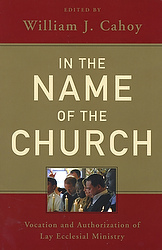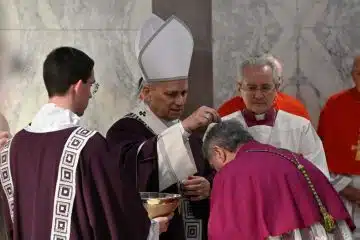Book makes important contribution to discussion of lay ministries
In the Name of the Church: Vocation and Authorization of Lay Ecclesial Ministry, edited by William Cahoy. Liturgical Press (Collegeville, Minn., 2012). 221 pp., $19.95.
Reviewed by Brother Jeffrey Gros, FSC Catholic News Service

For Catholics who have grown up after the Second Vatican Council, lay educators, liturgical ministers, social servants and a host of other ministers in the parish are a familiar sight.
Some may presume these are helpers for the religious and priests, others that these are employees or volunteers. However, there is a deeper understanding and practice of the church behind the presence of these ecclesial lay ministers, which is both new and evolving in the Catholic theology of the church.
“In the Name of the Church” makes an important contribution to this discussion, featuring the vocational and authorization dimensions of these new ministers and ministries.
The council moved from an understanding of church, often focused on its institutional and clerical elements, to a theology rooted in the vocation of all the baptized in the differentiated body of Christ, where ordained and lay are common disciples of Christ in serving the one mission of the church. Within the variety of the lay vocation, many are called to marriage, most are called to labor in the world, but some carry a vocation to service within the church.
The understanding of these roles and the structures of the church that support and form them are early in their evolution. The U.S. bishops have given helpful direction to the development at this stage of its history: “Co-Workers in the Vineyard of the Lord” (2005). This volume is the result of a consultation among the bishops, theologians and experienced ministers, providing an interdisciplinary exploration that will inevitably contribution to the development of these ministries.
Characteristic of these ministries is leadership, authorization, collaboration with priests and bishops, and appropriate formation. The volume ends with eight conclusions: Lay ecclesial ministries are the work of the Holy Spirit, are rooted in baptism and are a genuine vocation. They create a distinctive set of relationships within the church, serve in the name of the church, are authorized by the bishop or his delegate, are invested by rituals which affirm and celebrate the particular ministry, and require systems of support and consistent policy across the church in the United States.
The book, divided into 10 chapters, includes a keynote address by Chicago Cardinal Francis E. George and an appendix listing the 43 three networks, universities and institutions that sponsored the 2011 Collegeville National Symposium on Lay Ecclesial Ministry, on which the book is based.
The first part of the book includes an overview of the church’s teaching on this category of ministry and the collaborative theological approach serving the process outlined in the volume. The second part focuses on vocation from a theological and biblical perspective, with an exemplary essay on one of these ministries, directors of religious education. Three essays on authorization follow, from theological, canonical and episcopal points of view. The last part includes two essays on the ritualization appropriate to these ministries, using the formation, certification and commissioning ritual of the Archdiocese of Chicago as the example.
Ecclesial lay ministries were developed out of the mission needs of Africa and Latin America before the council. The renewed understanding of baptism, ministry and communion developed in the council gave a doctrinal basis and universal impetus to a renewed lay vocation, including ecclesial vocations within them.
The variety of cultures and ecclesial needs and leadership around the world have begun to fill out this vision of the council with an emerging theology and practice of ministry. This volume harvests some of the best U.S. thinking on the understanding and implementation of ministry. It will be important reading not only for ecclesial ministers, lay and clergy, but for all informed Catholics in leadership, so that this vision may imbue the full life of the church in the 21st century.
Brother Gros, a member of the Brothers of the Christian Schools, is resident scholar in Catholic studies at Lewis University in Romeoville, Ill.













